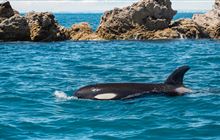Orca update – 5:30pm, Tuesday 20 July 2021
Archived content: This media release was accurate on the date of publication.
Introduction
Sightings of orca in the Wellington region made earlier today have been investigated, but searches by boat and air have not been able to locate a pod.Date: 20 July 2021
“We continue to monitor the health of the orca calf and it remains in a stable condition,” says Ian Angus, Department of Conservation (DOC) Marine Species Manager.
“We’re very conscious the length of time the calf has been in our care, away from its pod and mother, is now over a week. That’s not ideal for such a young wild animal.
“Tonight the orca will remain in the temporary holding pool, but we will review options tomorrow morning, factoring in weather conditions, any health warnings about the seawater in the harbour, and the calf’s welfare.
“The health and welfare of the calf are central to our decision making.”
Access to the site remains restricted to reduce stress for the orca calf.
International experts that DOC has been consulting with now believe the calf may be between 2–6 months of age, rather than 4–6 months as had been originally suspected. The age of the orca calf naturally determines how long the calf needs care and feeding.
Last Sunday (11 July), the orca calf was stranded on rocks near Plimmerton, north of Wellington. An ongoing operation to care for the orca calf is being led by DOC with support from Orca Research Trust/Whale Rescue Trust, local iwi Ngāti Toa Rangatira, and the local community.
DOC, veterinarians and Whale Rescue/Orca Research Trust are receiving regular advice from international orca experts and veterinarians – information proving vital as decisions are made.
Updates on the stranded juvenile orca in Porirua
Contact
For media enquiries contact:
Email: media@doc.govt.nz

